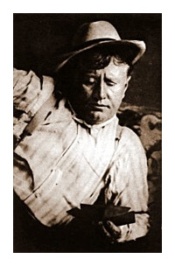O. HENRY: The Memento
 The Memento
The Memento
by O. Henry
Miss Lynnette D’Armande turned her back on Broadway. This was but tit for tat, because Broadway had often done the same thing to Miss D’Armande. Still, the “tats” seemed to have it, for the ex-leading lady of the “Reaping the Whirlwind” Company had everything to ask of Broadway, while there was no vice versa.
So Miss Lynnette D’Armande turned the back of her chair to her window that overlooked Broadway, and sat down to stitch in time the lisle-thread heel of a black silk stocking. The tumult and glitter of the roaring Broadway beneath her window had no charm for her; what she greatly desired was the stifling air of a dressing-room on that fairyland street and the roar of an audience gathered in that capricious quarter. In the meantime, those stockings must not be neglected. Silk does wear out so, but—after all, isn’t it just the only goods there is?
The Hotel Thalia looks on Broadway as Marathon looks on the sea. It stands like a gloomy cliff above the whirlpool where the tides of two great thoroughfares clash. Here the player-bands gather at the end of their wanderings, to loosen the buskin and dust the sock. Thick in the streets around it are booking- offices, theatres, agents, schools, and the lobster-palaces to which those thorny paths lead.
Wandering through the eccentric halls of the dim and fusty Thalia, you seem to have found yourself in some great ark or caravan about to sail, or fly, or roll away on wheels. About the house lingers a sense of unrest, of expectation, of transientness, even of anxiety and apprehension. The halls are a labyrinth. Without a guide you wander like a lost soul in a Sam Loyd puzzle.
Turning any corner, a dressing-sack or a cul-de-sac may bring you up short. You meet alarming tragedians stalking in bath-robes in search of rumoured bath-rooms. From hundreds of rooms come the buzz of talk, scraps of new and old songs, and the ready laughter of the convened players.
Summer has come; their companies have disbanded, and they take their rest in their favourite caravansary, while they besiege the managers for engagements for the coming season.
At this hour of the afternoon the day’s work of tramping the rounds of the agents’ offices is over. Past you, as you ramble distractedly through the mossy halls, flit audible visions of houris, with veiled, starry eyes, flying tag-ends of things, and a swish of silk, bequeathing to the dull hallways an odour of gaiety and a memory of frangipanni. Serious young comedians, with versatile Adam’s apples, gather in doorways and talk of Booth. Far-reaching from somewhere comes the smell of ham and red cabbage, and the crash of dishes on the American plan.
The indeterminate hum of life in the Thalia is enlivened by the discreet popping—at reasonable and salubrious intervals—of beer-bottle corks. Thus punctuated, life in the genial hostel scans easily—the comma being the favourite mark, semicolons frowned upon, and periods barred.
Miss D’Armande’s room was a small one. There was room for her rocker between the dresser and the wash-stand if it were placed longitudinally. On the dresser were its usual accoutrements, plus the ex- leading lady’s collected souvenirs of road engagements and photographs of her dearest and best professional friends.
At one of these photographs she looked twice or thrice as she darned, and smiled friendlily.
“I’d like to know where Lee is just this minute,” she said, half-aloud.
If you had been privileged to view the photograph thus flattered, you would have thought at the first glance that you saw the picture of a many-petalled, white flower, blown through the air by a storm. But the floral kingdom was not responsible for that swirl of petalous whiteness.
You saw the filmy, brief skirt of Miss Rosalie Ray as she made a complete heels-over-head turn in her wistaria-entwined swing, far out from the stage, high above the heads of the audience. You saw the
O. Henry
(1862 – 1910)
The Memento
fleursdumal.nl magazine
More in: Archive G-H, Henry, O.

